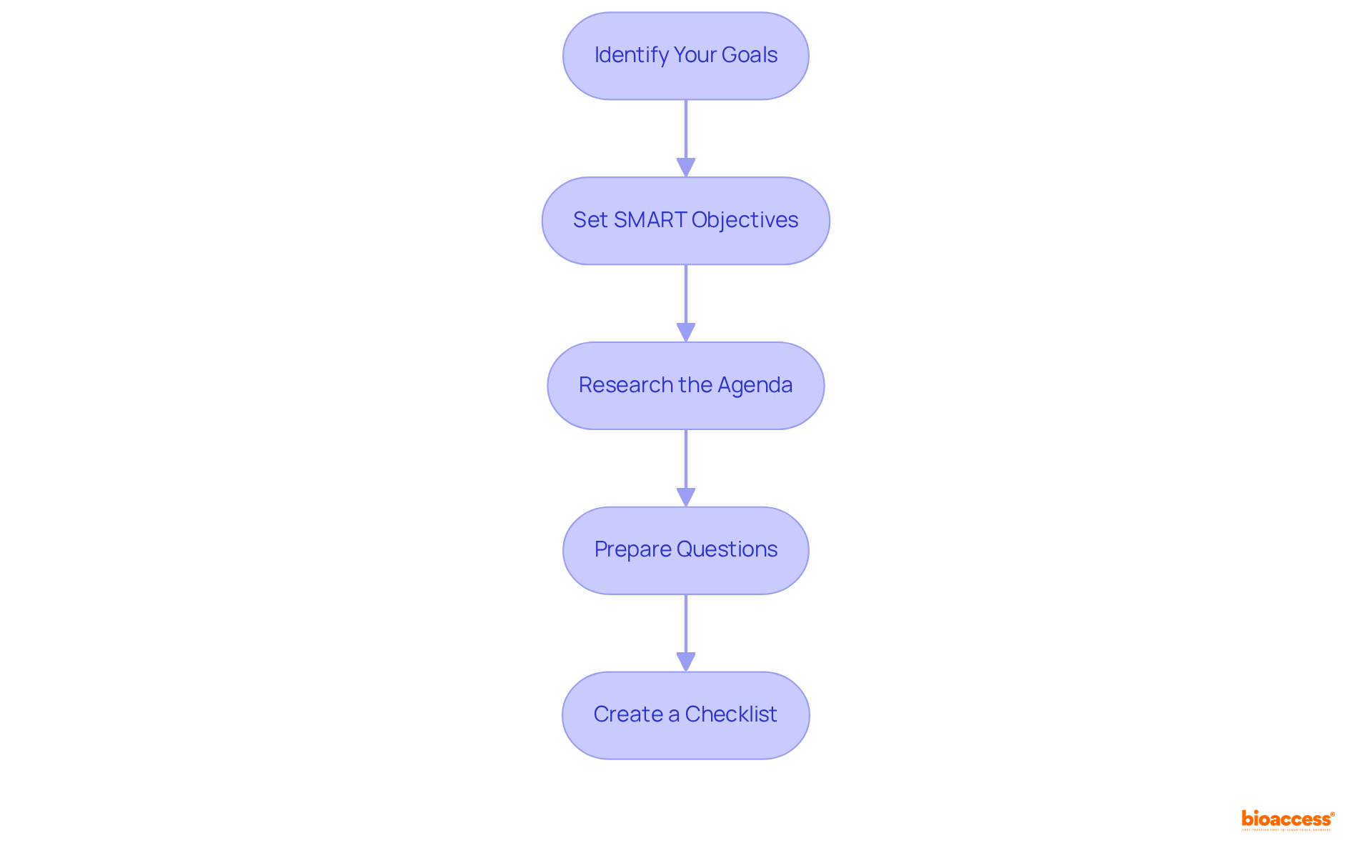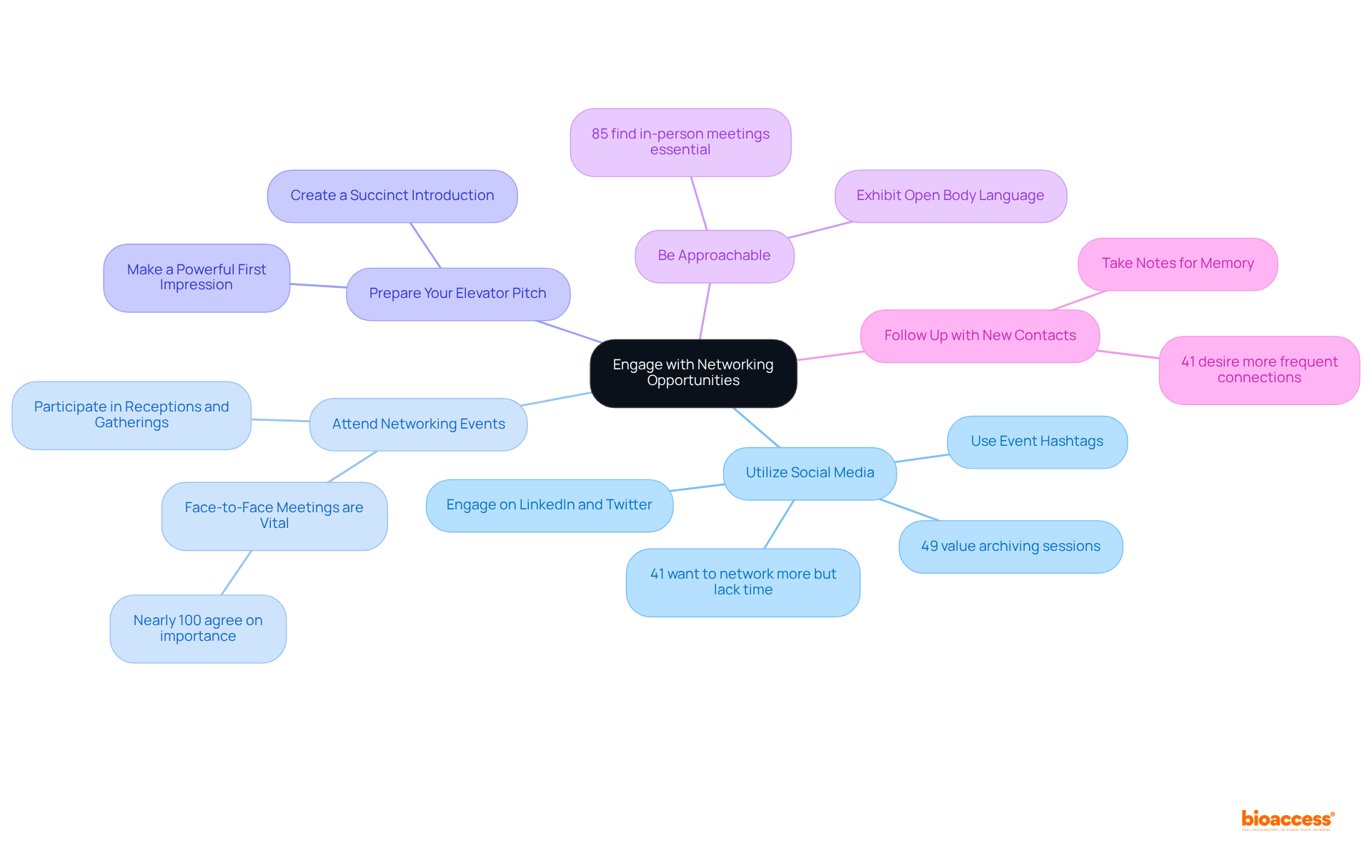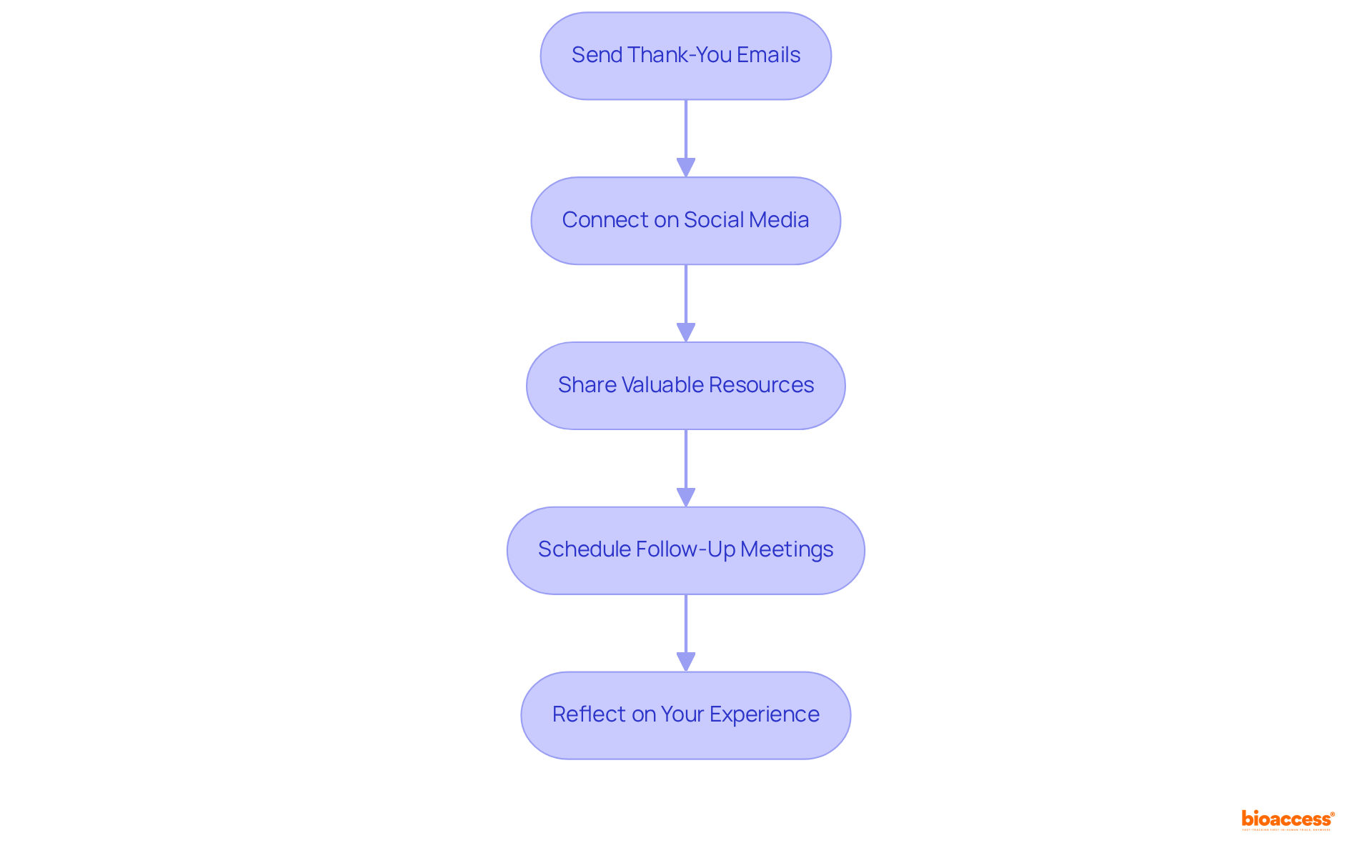


The article outlines three essential steps to optimize your experience at the Bio Conference 2025:
Each step underscores the significance of clear goal-setting, proactive networking strategies, and the importance of maintaining connections to enhance professional relationships and opportunities. This approach is supported by relevant statistics and expert insights throughout the content, reinforcing the necessity of strategic planning in clinical research.
Navigating the bustling environment of a major conference like Bio Conference 2025 presents an exhilarating yet overwhelming challenge. With thousands of attendees and a plethora of sessions, the potential for networking and learning is immense. However, strategic planning is essential to truly maximize this experience.
This guide outlines critical steps to assist attendees in:
How can one ensure that the time invested in attending the conference translates into meaningful relationships and valuable insights?
Identify Your Goals: Begin by establishing what you aim to achieve at the bio conference 2025. Are you seeking to network with industry leaders, gain insights into the latest trends, or explore potential collaborations? Documenting your objectives will help keep them in focus. A survey indicates that 87% of marketers regard events as the most effective marketing channel for their companies, underscoring the necessity of clear objectives.
Set SMART Objectives: Apply the SMART criteria (Specific, Measurable, Achievable, Relevant, Time-bound) to refine your goals. For instance, rather than stating 'I want to network,' specify 'I want to connect with at least five potential partners in the Medtech sector.' As Dave Lutz, Managing Director of Velvet Chainsaw Consulting, asserts, "The single-most important performance metric for gauging annual meeting health is attendance loyalty," highlighting the critical nature of precise goal-setting.
Research the Agenda: Acquaint yourself with the conference schedule. Identify sessions, workshops, and networking events that align with your objectives. This preparation will enable you to prioritize your time effectively for the bio conference 2025. A case study on "Revenue Diversification in Conferences" illustrates that effective goal-setting contributes significantly to financial stability and success at events.
Prepare Questions: Consider the questions you wish to pose to speakers or potential contacts. This foresight will facilitate more meaningful engagement during discussions. Establishing SMART objectives also aids in managing project deadlines and team contributions efficiently, ensuring you maximize your interactions.
Create a Checklist: Assemble a checklist of your goals, sessions to attend, and questions to ask. This will serve as a valuable reference throughout the event, assisting you in staying organized and focused on your objectives.

Utilize Social Media: Engage proactively with attendees and speakers on platforms such as LinkedIn and Twitter before the event. Leverage the event hashtag to participate in discussions and express your enthusiasm for attending. Statistics indicate that 49% of professionals value the ability to archive sessions through online networking, highlighting its effectiveness as a connection tool. Moreover, 41% of individuals seeking connections wish to engage more frequently but encounter time constraints, underscoring the importance of effective social media interaction strategies.
Attend Networking Events: Actively participate in scheduled networking events, receptions, and informal gatherings. These environments typically foster a more relaxed atmosphere conducive to making connections. Nearly 100% of professionals assert that face-to-face meetings are vital for nurturing long-term business relationships, as reported by HubSpot, reinforcing the significance of in-person interactions.
Prepare Your Elevator Pitch: Formulate a succinct introduction that encapsulates who you are, what you do, and what you aim to achieve at the event. This preparation will enable you to create a powerful first impression.
Be Approachable: Exhibit open body language and a welcoming demeanor. A smile and direct eye contact can invite meaningful conversations. Research shows that 85% of professionals consider in-person meetings essential for cultivating stronger business relationships.
Follow Up with New Contacts: After meeting someone, take notes about your conversation to aid your memory during follow-up. Following up is crucial, as 41% of individuals in the field express a desire for more frequent connections but face time constraints. A considerate follow-up can solidify new relationships and pave the way for future opportunities.

Send Thank-You Emails: Within a week of the event, it is imperative to send personalized thank-you emails to the individuals you met. Reference specific topics discussed to jog their memory and reinforce your connection. This approach not only expresses gratitude but also significantly enhances the likelihood of a continued dialogue, as follow-up emails can increase response rates. However, exercise caution; next-day follow-ups can lead to a decrease in response rates by as much as 11%.
Connect on Social Media: If you haven't already, establish connections with your new contacts on LinkedIn or other relevant platforms. This keeps you within their network and facilitates ongoing engagement. Personalized connection requests can further strengthen your relationship, as tailored communication is highly valued in professional settings.
Share Valuable Resources: When you encounter articles, studies, or resources relevant to your discussions, share them with your contacts. This demonstrates thoughtfulness and keeps the conversation alive, fostering a sense of collaboration. Sharing valuable insights can also position you as a knowledgeable resource in your field.
Schedule Follow-Up Meetings: For potential collaborators or partners identified during the event, propose a follow-up meeting to explore opportunities in greater detail. This can be conducted via video call or in-person, depending on feasibility. Timely follow-ups are crucial, as businesses that reach out first often secure a competitive advantage. Remember, persistence is key; 60% of customers say 'no' four times before accepting a sales offer.
Reflect on Your Experience: Take the time to review your notes and reflect on what you learned at the conference. Consider how you can apply this knowledge to your work and future networking efforts. Engaging in self-reflection can greatly enhance your professional growth and improve your approach to future interactions.

Maximizing the experience at the bio conference 2025 hinges on strategic preparation, active engagement, and thoughtful follow-up. Clearly defining goals and objectives enables attendees to navigate the event purposefully, ensuring that every interaction and session aligns with their professional aspirations. This focused approach not only enhances the conference experience but also sets the stage for meaningful connections and collaborations.
Las estrategias clave incluyen:
Attendees are encouraged to:
Furthermore, a robust follow-up strategy, including personalized thank-you emails and sharing valuable resources, is essential for solidifying connections and maximizing the benefits of the event.
Ultimately, the bio conference 2025 presents a unique opportunity for growth, learning, and networking within the industry. By implementing these strategies, attendees can enhance their own experience and contribute to a vibrant and collaborative community. Embrace the chance to connect, learn, and grow, ensuring that the insights gained at the conference translate into lasting professional relationships and opportunities.
What should I do to prepare for the bio conference 2025?
Begin by identifying your goals for the conference, such as networking with industry leaders, gaining insights into trends, or exploring collaborations. Documenting these objectives will help maintain focus.
How can I refine my conference goals?
Apply the SMART criteria to your goals, making them Specific, Measurable, Achievable, Relevant, and Time-bound. For example, instead of saying 'I want to network,' specify 'I want to connect with at least five potential partners in the Medtech sector.'
Why is it important to research the conference agenda?
Researching the agenda helps you identify sessions, workshops, and networking events that align with your objectives, allowing you to prioritize your time effectively during the conference.
What type of questions should I prepare for the conference?
Consider the questions you want to ask speakers or potential contacts. Preparing these questions in advance will facilitate more meaningful engagement during discussions.
How can I stay organized during the conference?
Create a checklist that includes your goals, sessions to attend, and questions to ask. This checklist will serve as a valuable reference throughout the event, helping you stay organized and focused on your objectives.